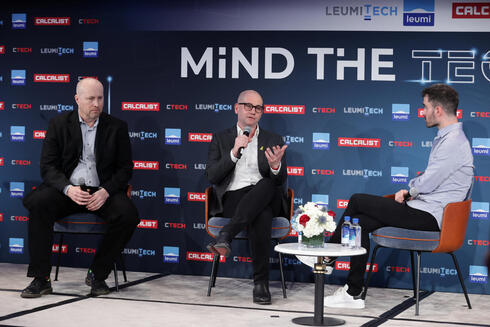
Mind the Tech NY 2024
Bank Leumi CIO: "Fintech does not disrupt banking, but complements it"
"Large organizations are learning how to deal with the introduction of AI,” Bank Leumi CIO Eyal Efrat said at Calcalist and Bank Leumi’s Mind the Tech conference in New York. Stephen Chase, Vice Chair, AI & Digital Innovation, at KPMG added, “There are many companies that need help and AI technologies that are still not ready to be integrated."
Bank Leumi CIO Eyal Efrat, KPMG's Stephen Chase
(Orel Cohen, Tomerico)
"Large organizations are learning how to deal with the introduction of artificial intelligence," according to Eyal Efrat, CIO at Bank Leumi and Steven Chase, Vice Chair, AI & Digital Innovation at KPMG in a joint conversation with Calcalist’s Yarden Rozanski at Calcalist and Bank Leumi’s Mind the Tech conference in New York
Stephen, what are the most critical elements of a successful AI transformation and what are the biggest challenges for businesses right now?
"Many companies are active in the field of AI, but large organizations have many difficulties in the transition, and therefore positions are being created for employees who will promote it correctly through the organization. There are many things that can be done now to acquire quality data and ensure responsible use. Everyone is looking at it now and throwing around slogans about the use of AI. It's more a change in people and less in technology."
Eyal, has fintech really succeeded in disrupting traditional banking?
"Disrupted is a very big word and fintech is an accelerator of innovation and many work above the banking layer. Fintech companies accelerated processes in the business world and are our partners and not competitors. There are many technological companies that did not start in the fintech world but do fit into the banking world and are of interest to us. Many technologies from there have accelerated our world of innovation.”
What new business opportunities does this situation create for banks?
Efrat: "We see many companies and opportunities, but as a bank we look at everything from a careful financial point of view. It is our job to look at them and see how we integrate them into our process, in the business process, in a careful way."
Chase: "There are many companies that need help and AI technologies that are still not ready to be integrated. We look at the customer's roadmap and the path they are taking and their growth opportunity and whether we can make a significant disruption."
How does the location of the banks in the ecosystem affect the wider technology market?
"As a bank, we are everywhere. We invest a lot in the industry and use it in a large number of places in the bank. In recent years, we have established an investment arm called The Garage that looks for new technologies and invests in them and organizes joint projects with them in the bank. When you touch on every aspect, including investments, this creates a significant advantage for you in the industry."
Stephen, AI has led to a lot of questions about workforce implications. What will be the biggest impacts on the workforce?
"I'm always told that AI will take jobs, but it's not always the case. People won't do the same things in the future, but the growth opportunity is significant here and you need to know how to deal with the change in the workforce and how to communicate it. In the short term, AI doesn't take jobs, but it’s likely a person with AI will outperform someone without it.”
You can watch the full exchange in the video above.
















